Globalization and Business Practices: A Comprehensive Report
VerifiedAdded on 2022/12/23
|18
|4618
|1
Report
AI Summary
This report comprehensively analyzes the impact of globalization on modern business practices, focusing on outsourcing and offshoring strategies. It explores the challenges and opportunities presented by globalization, including increased competition, technological advancements, and the rise of cross-cultural teams. The report examines the knowledge requirements for international managers, emphasizing organizational processes, market trends, and conflict resolution. A key aspect is the assessment of the Apple Inc. and Foxconn partnership, highlighting the effects of the US-China trade war on their production and market share. The report discusses the contributions of outsourcing and offshoring to globalization, providing insights into the mutual development of economies and the interconnectedness of global markets. The report concludes by recommending strategies for businesses to navigate the complexities of globalization and succeed in an increasingly interconnected world. The provided report is a student contribution to Desklib, a platform designed to provide students with AI-powered study tools and resources, including past papers and assignment solutions.
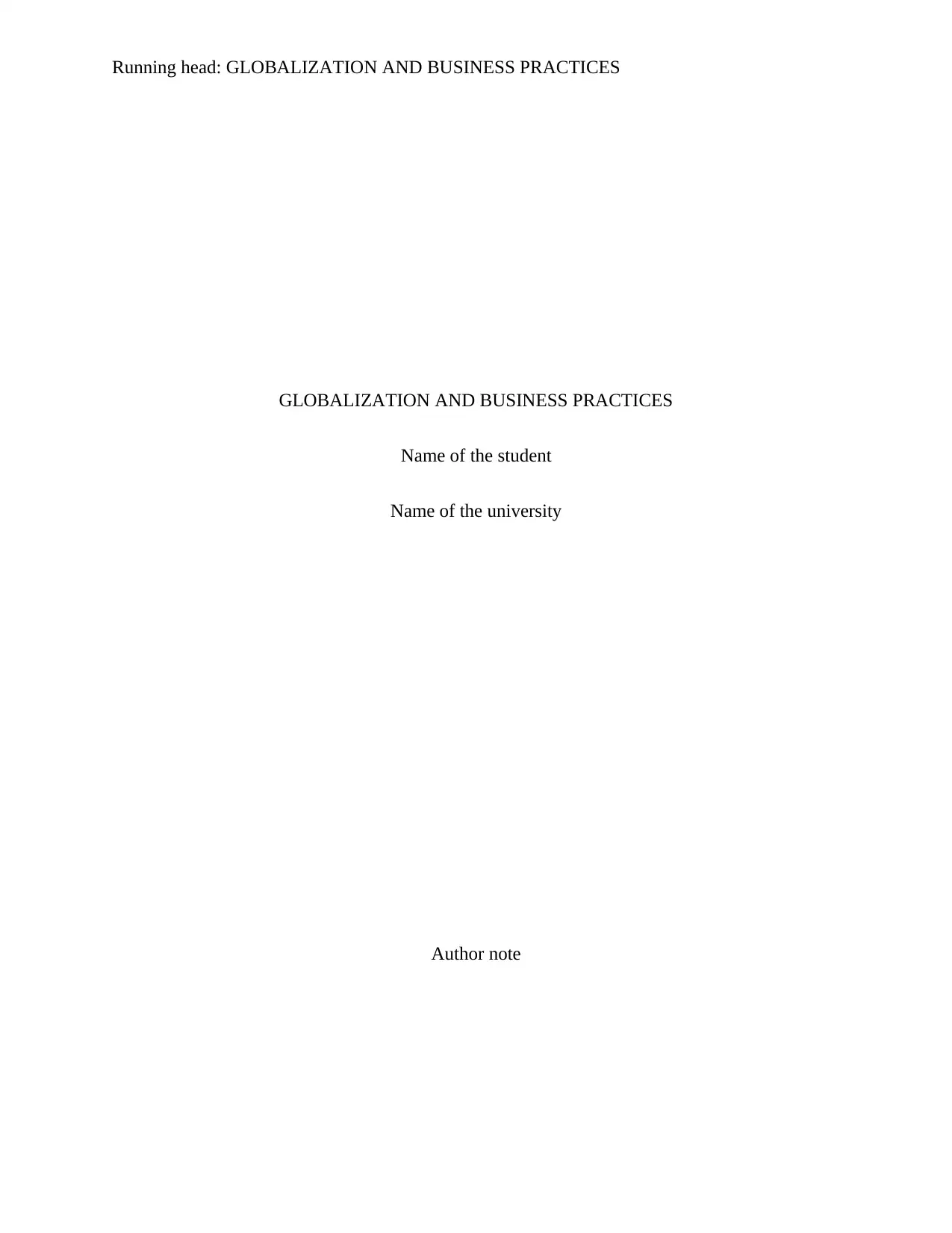
Running head: GLOBALIZATION AND BUSINESS PRACTICES
GLOBALIZATION AND BUSINESS PRACTICES
Name of the student
Name of the university
Author note
GLOBALIZATION AND BUSINESS PRACTICES
Name of the student
Name of the university
Author note
Paraphrase This Document
Need a fresh take? Get an instant paraphrase of this document with our AI Paraphraser
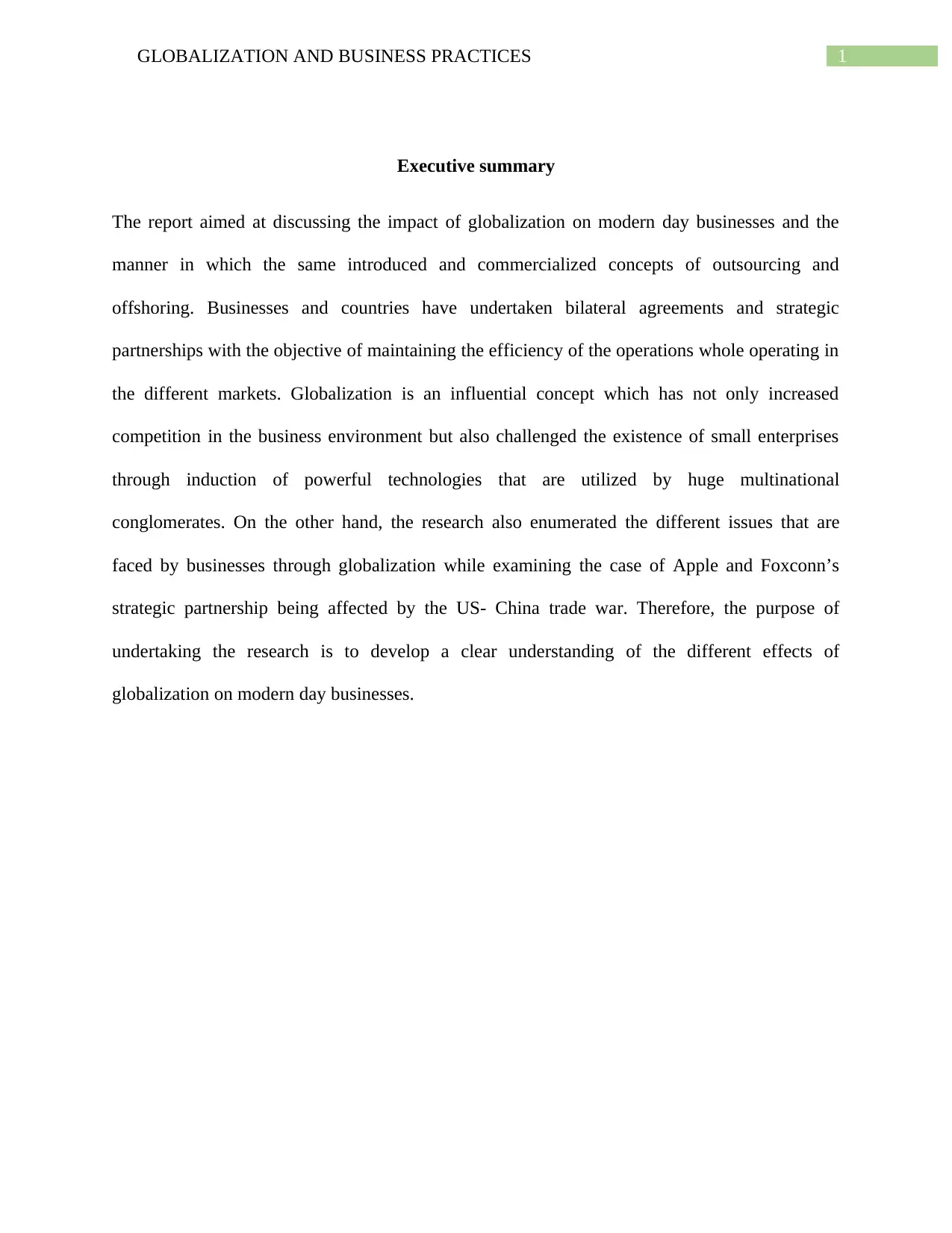
1GLOBALIZATION AND BUSINESS PRACTICES
Executive summary
The report aimed at discussing the impact of globalization on modern day businesses and the
manner in which the same introduced and commercialized concepts of outsourcing and
offshoring. Businesses and countries have undertaken bilateral agreements and strategic
partnerships with the objective of maintaining the efficiency of the operations whole operating in
the different markets. Globalization is an influential concept which has not only increased
competition in the business environment but also challenged the existence of small enterprises
through induction of powerful technologies that are utilized by huge multinational
conglomerates. On the other hand, the research also enumerated the different issues that are
faced by businesses through globalization while examining the case of Apple and Foxconn’s
strategic partnership being affected by the US- China trade war. Therefore, the purpose of
undertaking the research is to develop a clear understanding of the different effects of
globalization on modern day businesses.
Executive summary
The report aimed at discussing the impact of globalization on modern day businesses and the
manner in which the same introduced and commercialized concepts of outsourcing and
offshoring. Businesses and countries have undertaken bilateral agreements and strategic
partnerships with the objective of maintaining the efficiency of the operations whole operating in
the different markets. Globalization is an influential concept which has not only increased
competition in the business environment but also challenged the existence of small enterprises
through induction of powerful technologies that are utilized by huge multinational
conglomerates. On the other hand, the research also enumerated the different issues that are
faced by businesses through globalization while examining the case of Apple and Foxconn’s
strategic partnership being affected by the US- China trade war. Therefore, the purpose of
undertaking the research is to develop a clear understanding of the different effects of
globalization on modern day businesses.
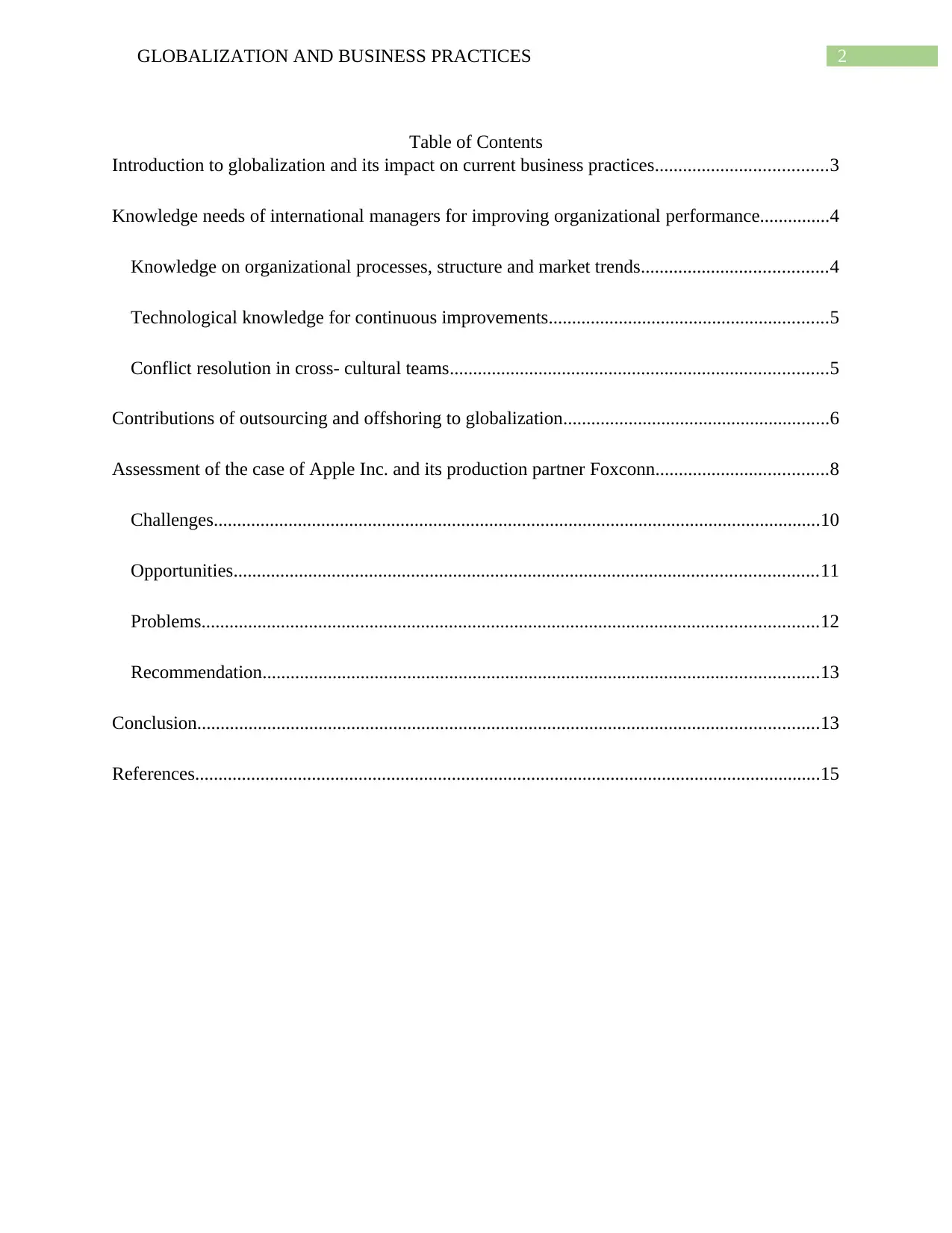
2GLOBALIZATION AND BUSINESS PRACTICES
Table of Contents
Introduction to globalization and its impact on current business practices.....................................3
Knowledge needs of international managers for improving organizational performance...............4
Knowledge on organizational processes, structure and market trends........................................4
Technological knowledge for continuous improvements............................................................5
Conflict resolution in cross- cultural teams.................................................................................5
Contributions of outsourcing and offshoring to globalization.........................................................6
Assessment of the case of Apple Inc. and its production partner Foxconn.....................................8
Challenges..................................................................................................................................10
Opportunities.............................................................................................................................11
Problems....................................................................................................................................12
Recommendation.......................................................................................................................13
Conclusion.....................................................................................................................................13
References......................................................................................................................................15
Table of Contents
Introduction to globalization and its impact on current business practices.....................................3
Knowledge needs of international managers for improving organizational performance...............4
Knowledge on organizational processes, structure and market trends........................................4
Technological knowledge for continuous improvements............................................................5
Conflict resolution in cross- cultural teams.................................................................................5
Contributions of outsourcing and offshoring to globalization.........................................................6
Assessment of the case of Apple Inc. and its production partner Foxconn.....................................8
Challenges..................................................................................................................................10
Opportunities.............................................................................................................................11
Problems....................................................................................................................................12
Recommendation.......................................................................................................................13
Conclusion.....................................................................................................................................13
References......................................................................................................................................15
⊘ This is a preview!⊘
Do you want full access?
Subscribe today to unlock all pages.

Trusted by 1+ million students worldwide
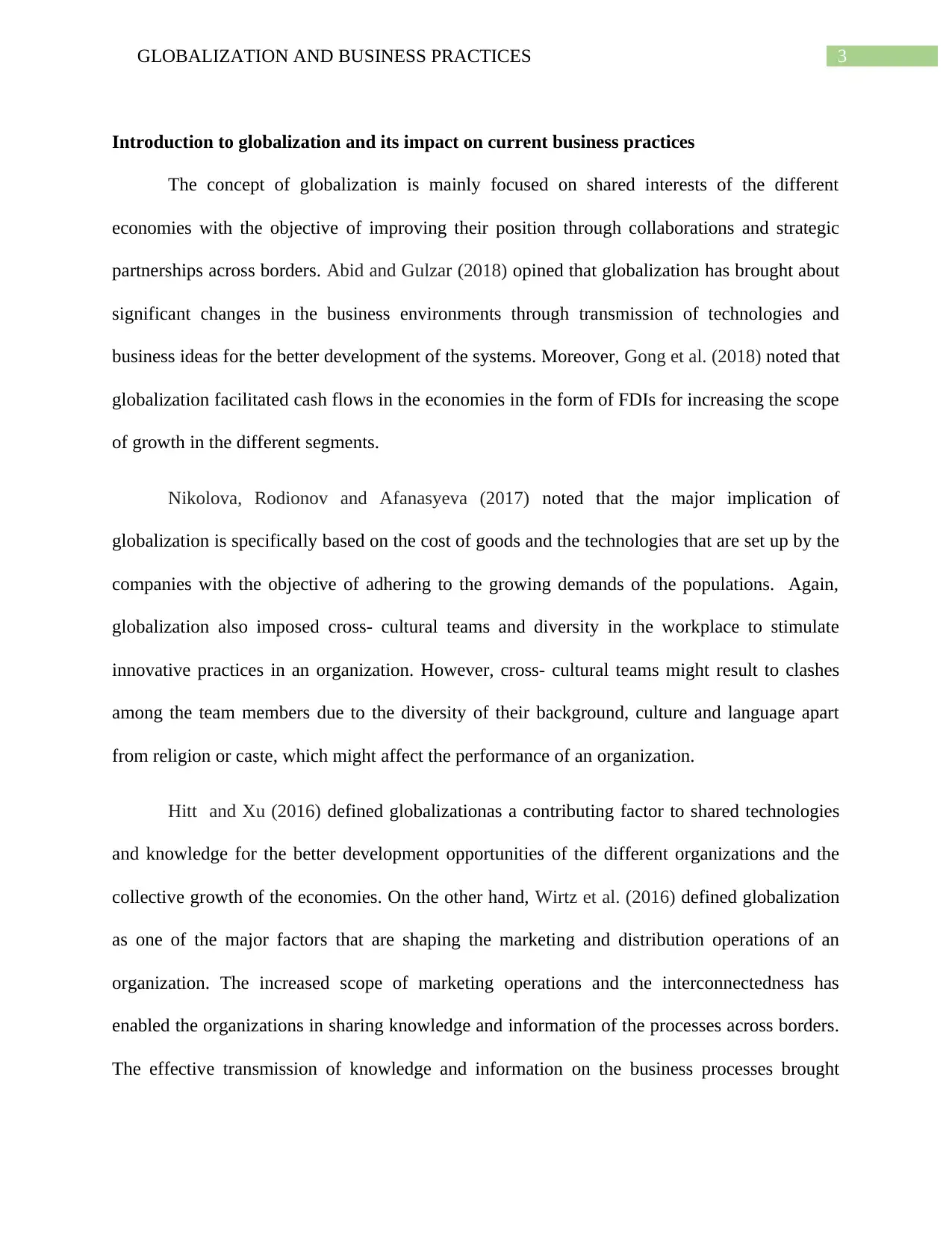
3GLOBALIZATION AND BUSINESS PRACTICES
Introduction to globalization and its impact on current business practices
The concept of globalization is mainly focused on shared interests of the different
economies with the objective of improving their position through collaborations and strategic
partnerships across borders. Abid and Gulzar (2018) opined that globalization has brought about
significant changes in the business environments through transmission of technologies and
business ideas for the better development of the systems. Moreover, Gong et al. (2018) noted that
globalization facilitated cash flows in the economies in the form of FDIs for increasing the scope
of growth in the different segments.
Nikolova, Rodionov and Afanasyeva (2017) noted that the major implication of
globalization is specifically based on the cost of goods and the technologies that are set up by the
companies with the objective of adhering to the growing demands of the populations. Again,
globalization also imposed cross- cultural teams and diversity in the workplace to stimulate
innovative practices in an organization. However, cross- cultural teams might result to clashes
among the team members due to the diversity of their background, culture and language apart
from religion or caste, which might affect the performance of an organization.
Hitt and Xu (2016) defined globalizationas a contributing factor to shared technologies
and knowledge for the better development opportunities of the different organizations and the
collective growth of the economies. On the other hand, Wirtz et al. (2016) defined globalization
as one of the major factors that are shaping the marketing and distribution operations of an
organization. The increased scope of marketing operations and the interconnectedness has
enabled the organizations in sharing knowledge and information of the processes across borders.
The effective transmission of knowledge and information on the business processes brought
Introduction to globalization and its impact on current business practices
The concept of globalization is mainly focused on shared interests of the different
economies with the objective of improving their position through collaborations and strategic
partnerships across borders. Abid and Gulzar (2018) opined that globalization has brought about
significant changes in the business environments through transmission of technologies and
business ideas for the better development of the systems. Moreover, Gong et al. (2018) noted that
globalization facilitated cash flows in the economies in the form of FDIs for increasing the scope
of growth in the different segments.
Nikolova, Rodionov and Afanasyeva (2017) noted that the major implication of
globalization is specifically based on the cost of goods and the technologies that are set up by the
companies with the objective of adhering to the growing demands of the populations. Again,
globalization also imposed cross- cultural teams and diversity in the workplace to stimulate
innovative practices in an organization. However, cross- cultural teams might result to clashes
among the team members due to the diversity of their background, culture and language apart
from religion or caste, which might affect the performance of an organization.
Hitt and Xu (2016) defined globalizationas a contributing factor to shared technologies
and knowledge for the better development opportunities of the different organizations and the
collective growth of the economies. On the other hand, Wirtz et al. (2016) defined globalization
as one of the major factors that are shaping the marketing and distribution operations of an
organization. The increased scope of marketing operations and the interconnectedness has
enabled the organizations in sharing knowledge and information of the processes across borders.
The effective transmission of knowledge and information on the business processes brought
Paraphrase This Document
Need a fresh take? Get an instant paraphrase of this document with our AI Paraphraser
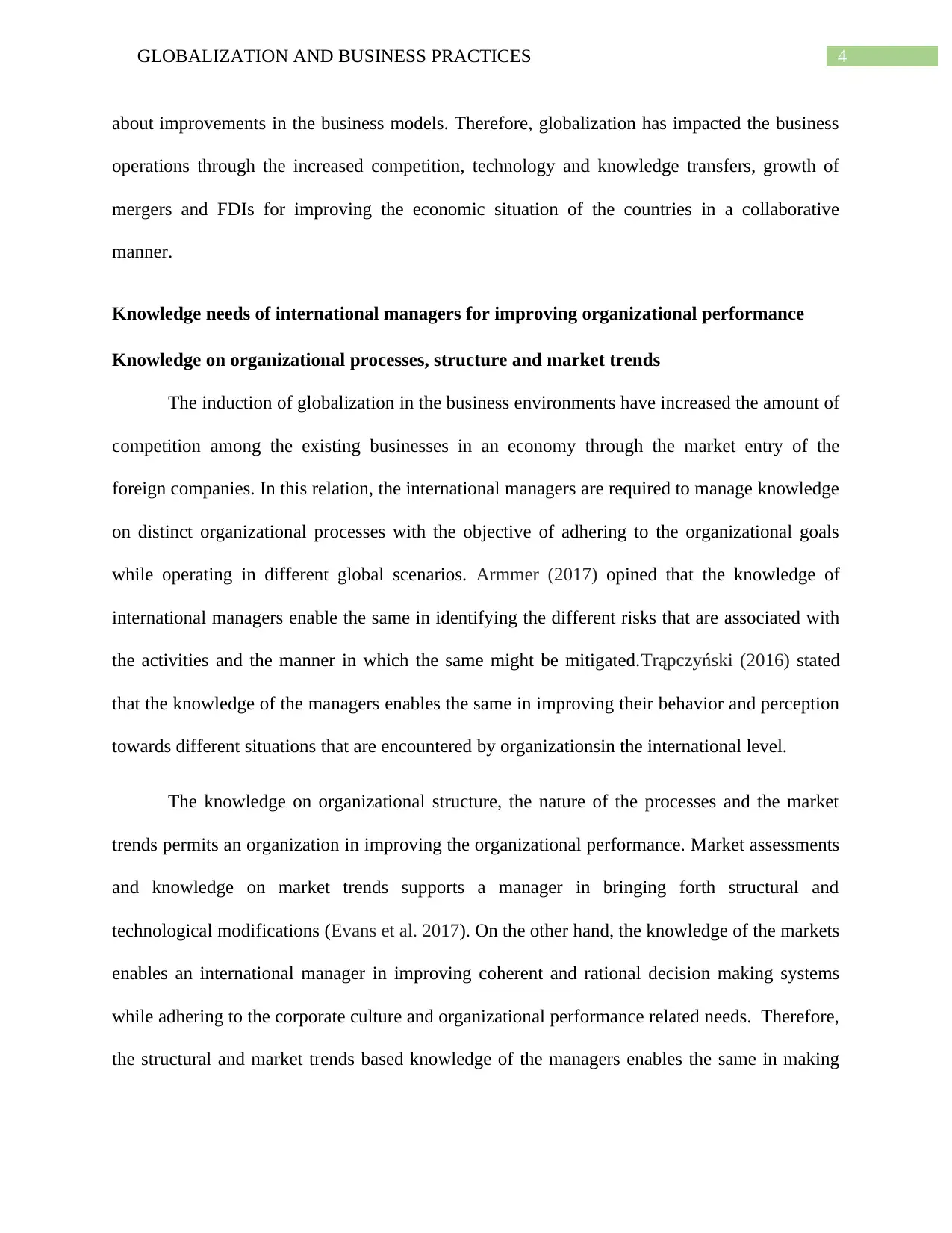
4GLOBALIZATION AND BUSINESS PRACTICES
about improvements in the business models. Therefore, globalization has impacted the business
operations through the increased competition, technology and knowledge transfers, growth of
mergers and FDIs for improving the economic situation of the countries in a collaborative
manner.
Knowledge needs of international managers for improving organizational performance
Knowledge on organizational processes, structure and market trends
The induction of globalization in the business environments have increased the amount of
competition among the existing businesses in an economy through the market entry of the
foreign companies. In this relation, the international managers are required to manage knowledge
on distinct organizational processes with the objective of adhering to the organizational goals
while operating in different global scenarios. Armmer (2017) opined that the knowledge of
international managers enable the same in identifying the different risks that are associated with
the activities and the manner in which the same might be mitigated.Trąpczyński (2016) stated
that the knowledge of the managers enables the same in improving their behavior and perception
towards different situations that are encountered by organizationsin the international level.
The knowledge on organizational structure, the nature of the processes and the market
trends permits an organization in improving the organizational performance. Market assessments
and knowledge on market trends supports a manager in bringing forth structural and
technological modifications (Evans et al. 2017). On the other hand, the knowledge of the markets
enables an international manager in improving coherent and rational decision making systems
while adhering to the corporate culture and organizational performance related needs. Therefore,
the structural and market trends based knowledge of the managers enables the same in making
about improvements in the business models. Therefore, globalization has impacted the business
operations through the increased competition, technology and knowledge transfers, growth of
mergers and FDIs for improving the economic situation of the countries in a collaborative
manner.
Knowledge needs of international managers for improving organizational performance
Knowledge on organizational processes, structure and market trends
The induction of globalization in the business environments have increased the amount of
competition among the existing businesses in an economy through the market entry of the
foreign companies. In this relation, the international managers are required to manage knowledge
on distinct organizational processes with the objective of adhering to the organizational goals
while operating in different global scenarios. Armmer (2017) opined that the knowledge of
international managers enable the same in identifying the different risks that are associated with
the activities and the manner in which the same might be mitigated.Trąpczyński (2016) stated
that the knowledge of the managers enables the same in improving their behavior and perception
towards different situations that are encountered by organizationsin the international level.
The knowledge on organizational structure, the nature of the processes and the market
trends permits an organization in improving the organizational performance. Market assessments
and knowledge on market trends supports a manager in bringing forth structural and
technological modifications (Evans et al. 2017). On the other hand, the knowledge of the markets
enables an international manager in improving coherent and rational decision making systems
while adhering to the corporate culture and organizational performance related needs. Therefore,
the structural and market trends based knowledge of the managers enables the same in making
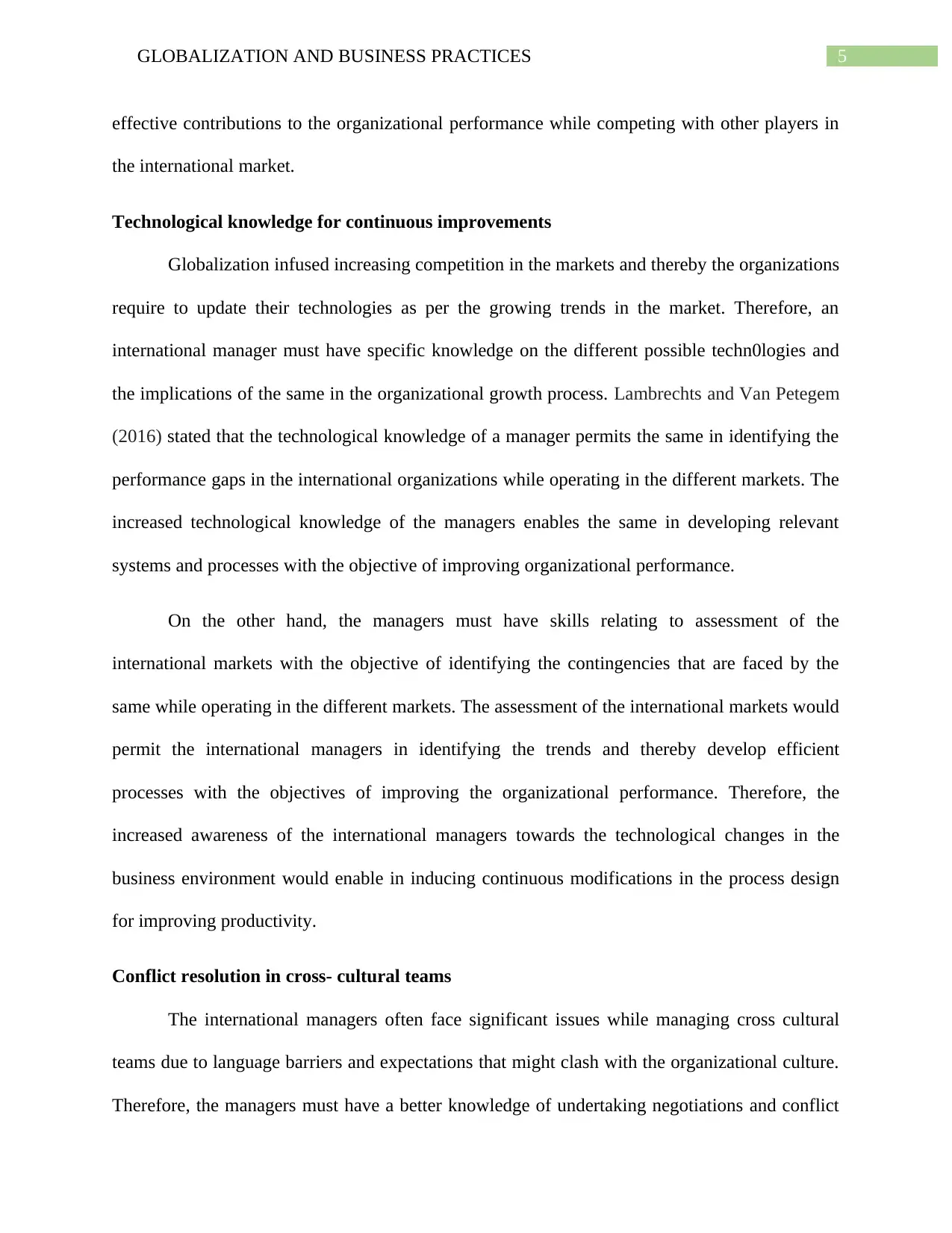
5GLOBALIZATION AND BUSINESS PRACTICES
effective contributions to the organizational performance while competing with other players in
the international market.
Technological knowledge for continuous improvements
Globalization infused increasing competition in the markets and thereby the organizations
require to update their technologies as per the growing trends in the market. Therefore, an
international manager must have specific knowledge on the different possible techn0logies and
the implications of the same in the organizational growth process. Lambrechts and Van Petegem
(2016) stated that the technological knowledge of a manager permits the same in identifying the
performance gaps in the international organizations while operating in the different markets. The
increased technological knowledge of the managers enables the same in developing relevant
systems and processes with the objective of improving organizational performance.
On the other hand, the managers must have skills relating to assessment of the
international markets with the objective of identifying the contingencies that are faced by the
same while operating in the different markets. The assessment of the international markets would
permit the international managers in identifying the trends and thereby develop efficient
processes with the objectives of improving the organizational performance. Therefore, the
increased awareness of the international managers towards the technological changes in the
business environment would enable in inducing continuous modifications in the process design
for improving productivity.
Conflict resolution in cross- cultural teams
The international managers often face significant issues while managing cross cultural
teams due to language barriers and expectations that might clash with the organizational culture.
Therefore, the managers must have a better knowledge of undertaking negotiations and conflict
effective contributions to the organizational performance while competing with other players in
the international market.
Technological knowledge for continuous improvements
Globalization infused increasing competition in the markets and thereby the organizations
require to update their technologies as per the growing trends in the market. Therefore, an
international manager must have specific knowledge on the different possible techn0logies and
the implications of the same in the organizational growth process. Lambrechts and Van Petegem
(2016) stated that the technological knowledge of a manager permits the same in identifying the
performance gaps in the international organizations while operating in the different markets. The
increased technological knowledge of the managers enables the same in developing relevant
systems and processes with the objective of improving organizational performance.
On the other hand, the managers must have skills relating to assessment of the
international markets with the objective of identifying the contingencies that are faced by the
same while operating in the different markets. The assessment of the international markets would
permit the international managers in identifying the trends and thereby develop efficient
processes with the objectives of improving the organizational performance. Therefore, the
increased awareness of the international managers towards the technological changes in the
business environment would enable in inducing continuous modifications in the process design
for improving productivity.
Conflict resolution in cross- cultural teams
The international managers often face significant issues while managing cross cultural
teams due to language barriers and expectations that might clash with the organizational culture.
Therefore, the managers must have a better knowledge of undertaking negotiations and conflict
⊘ This is a preview!⊘
Do you want full access?
Subscribe today to unlock all pages.

Trusted by 1+ million students worldwide
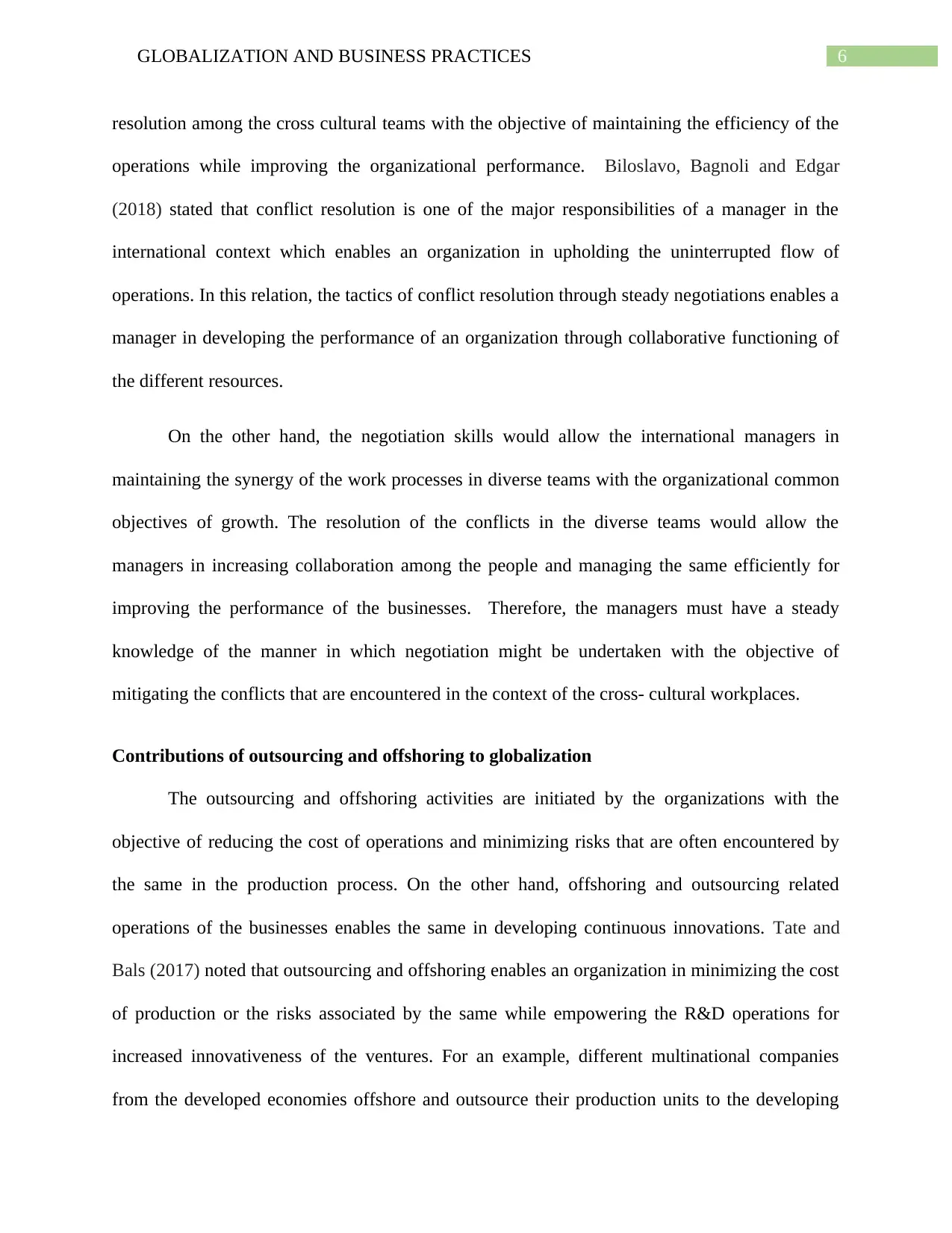
6GLOBALIZATION AND BUSINESS PRACTICES
resolution among the cross cultural teams with the objective of maintaining the efficiency of the
operations while improving the organizational performance. Biloslavo, Bagnoli and Edgar
(2018) stated that conflict resolution is one of the major responsibilities of a manager in the
international context which enables an organization in upholding the uninterrupted flow of
operations. In this relation, the tactics of conflict resolution through steady negotiations enables a
manager in developing the performance of an organization through collaborative functioning of
the different resources.
On the other hand, the negotiation skills would allow the international managers in
maintaining the synergy of the work processes in diverse teams with the organizational common
objectives of growth. The resolution of the conflicts in the diverse teams would allow the
managers in increasing collaboration among the people and managing the same efficiently for
improving the performance of the businesses. Therefore, the managers must have a steady
knowledge of the manner in which negotiation might be undertaken with the objective of
mitigating the conflicts that are encountered in the context of the cross- cultural workplaces.
Contributions of outsourcing and offshoring to globalization
The outsourcing and offshoring activities are initiated by the organizations with the
objective of reducing the cost of operations and minimizing risks that are often encountered by
the same in the production process. On the other hand, offshoring and outsourcing related
operations of the businesses enables the same in developing continuous innovations. Tate and
Bals (2017) noted that outsourcing and offshoring enables an organization in minimizing the cost
of production or the risks associated by the same while empowering the R&D operations for
increased innovativeness of the ventures. For an example, different multinational companies
from the developed economies offshore and outsource their production units to the developing
resolution among the cross cultural teams with the objective of maintaining the efficiency of the
operations while improving the organizational performance. Biloslavo, Bagnoli and Edgar
(2018) stated that conflict resolution is one of the major responsibilities of a manager in the
international context which enables an organization in upholding the uninterrupted flow of
operations. In this relation, the tactics of conflict resolution through steady negotiations enables a
manager in developing the performance of an organization through collaborative functioning of
the different resources.
On the other hand, the negotiation skills would allow the international managers in
maintaining the synergy of the work processes in diverse teams with the organizational common
objectives of growth. The resolution of the conflicts in the diverse teams would allow the
managers in increasing collaboration among the people and managing the same efficiently for
improving the performance of the businesses. Therefore, the managers must have a steady
knowledge of the manner in which negotiation might be undertaken with the objective of
mitigating the conflicts that are encountered in the context of the cross- cultural workplaces.
Contributions of outsourcing and offshoring to globalization
The outsourcing and offshoring activities are initiated by the organizations with the
objective of reducing the cost of operations and minimizing risks that are often encountered by
the same in the production process. On the other hand, offshoring and outsourcing related
operations of the businesses enables the same in developing continuous innovations. Tate and
Bals (2017) noted that outsourcing and offshoring enables an organization in minimizing the cost
of production or the risks associated by the same while empowering the R&D operations for
increased innovativeness of the ventures. For an example, different multinational companies
from the developed economies offshore and outsource their production units to the developing
Paraphrase This Document
Need a fresh take? Get an instant paraphrase of this document with our AI Paraphraser
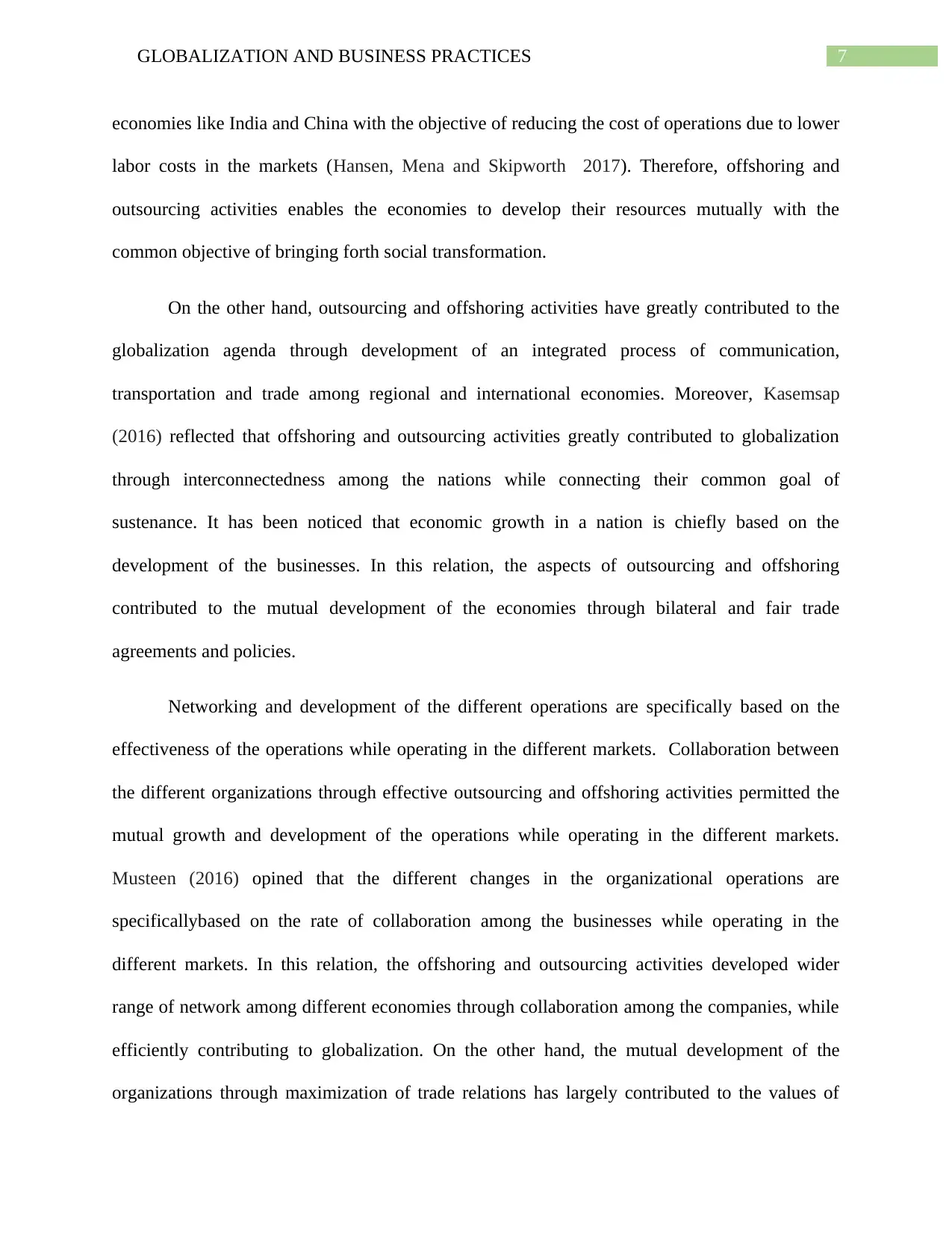
7GLOBALIZATION AND BUSINESS PRACTICES
economies like India and China with the objective of reducing the cost of operations due to lower
labor costs in the markets (Hansen, Mena and Skipworth 2017). Therefore, offshoring and
outsourcing activities enables the economies to develop their resources mutually with the
common objective of bringing forth social transformation.
On the other hand, outsourcing and offshoring activities have greatly contributed to the
globalization agenda through development of an integrated process of communication,
transportation and trade among regional and international economies. Moreover, Kasemsap
(2016) reflected that offshoring and outsourcing activities greatly contributed to globalization
through interconnectedness among the nations while connecting their common goal of
sustenance. It has been noticed that economic growth in a nation is chiefly based on the
development of the businesses. In this relation, the aspects of outsourcing and offshoring
contributed to the mutual development of the economies through bilateral and fair trade
agreements and policies.
Networking and development of the different operations are specifically based on the
effectiveness of the operations while operating in the different markets. Collaboration between
the different organizations through effective outsourcing and offshoring activities permitted the
mutual growth and development of the operations while operating in the different markets.
Musteen (2016) opined that the different changes in the organizational operations are
specificallybased on the rate of collaboration among the businesses while operating in the
different markets. In this relation, the offshoring and outsourcing activities developed wider
range of network among different economies through collaboration among the companies, while
efficiently contributing to globalization. On the other hand, the mutual development of the
organizations through maximization of trade relations has largely contributed to the values of
economies like India and China with the objective of reducing the cost of operations due to lower
labor costs in the markets (Hansen, Mena and Skipworth 2017). Therefore, offshoring and
outsourcing activities enables the economies to develop their resources mutually with the
common objective of bringing forth social transformation.
On the other hand, outsourcing and offshoring activities have greatly contributed to the
globalization agenda through development of an integrated process of communication,
transportation and trade among regional and international economies. Moreover, Kasemsap
(2016) reflected that offshoring and outsourcing activities greatly contributed to globalization
through interconnectedness among the nations while connecting their common goal of
sustenance. It has been noticed that economic growth in a nation is chiefly based on the
development of the businesses. In this relation, the aspects of outsourcing and offshoring
contributed to the mutual development of the economies through bilateral and fair trade
agreements and policies.
Networking and development of the different operations are specifically based on the
effectiveness of the operations while operating in the different markets. Collaboration between
the different organizations through effective outsourcing and offshoring activities permitted the
mutual growth and development of the operations while operating in the different markets.
Musteen (2016) opined that the different changes in the organizational operations are
specificallybased on the rate of collaboration among the businesses while operating in the
different markets. In this relation, the offshoring and outsourcing activities developed wider
range of network among different economies through collaboration among the companies, while
efficiently contributing to globalization. On the other hand, the mutual development of the
organizations through maximization of trade relations has largely contributed to the values of
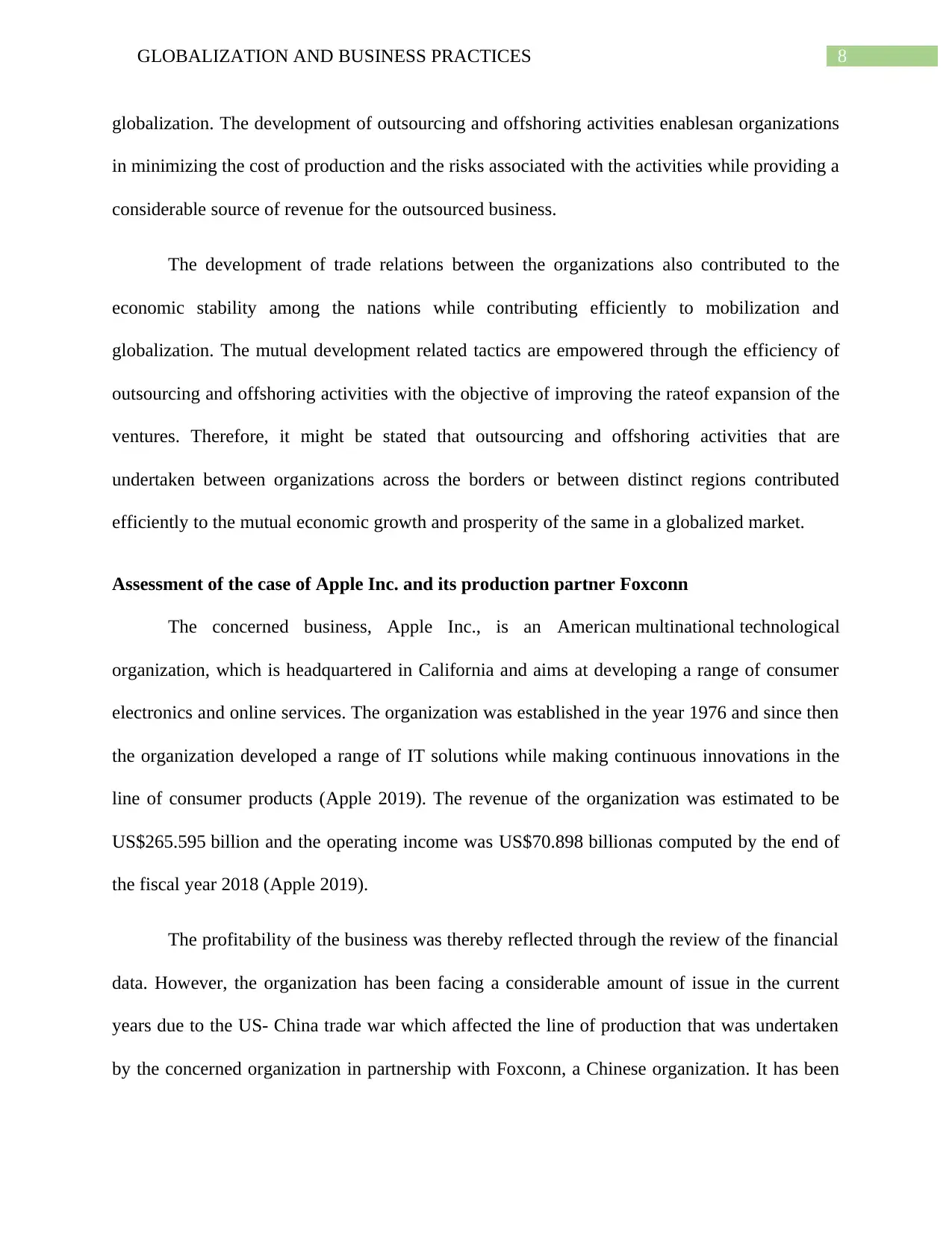
8GLOBALIZATION AND BUSINESS PRACTICES
globalization. The development of outsourcing and offshoring activities enablesan organizations
in minimizing the cost of production and the risks associated with the activities while providing a
considerable source of revenue for the outsourced business.
The development of trade relations between the organizations also contributed to the
economic stability among the nations while contributing efficiently to mobilization and
globalization. The mutual development related tactics are empowered through the efficiency of
outsourcing and offshoring activities with the objective of improving the rateof expansion of the
ventures. Therefore, it might be stated that outsourcing and offshoring activities that are
undertaken between organizations across the borders or between distinct regions contributed
efficiently to the mutual economic growth and prosperity of the same in a globalized market.
Assessment of the case of Apple Inc. and its production partner Foxconn
The concerned business, Apple Inc., is an American multinational technological
organization, which is headquartered in California and aims at developing a range of consumer
electronics and online services. The organization was established in the year 1976 and since then
the organization developed a range of IT solutions while making continuous innovations in the
line of consumer products (Apple 2019). The revenue of the organization was estimated to be
US$265.595 billion and the operating income was US$70.898 billionas computed by the end of
the fiscal year 2018 (Apple 2019).
The profitability of the business was thereby reflected through the review of the financial
data. However, the organization has been facing a considerable amount of issue in the current
years due to the US- China trade war which affected the line of production that was undertaken
by the concerned organization in partnership with Foxconn, a Chinese organization. It has been
globalization. The development of outsourcing and offshoring activities enablesan organizations
in minimizing the cost of production and the risks associated with the activities while providing a
considerable source of revenue for the outsourced business.
The development of trade relations between the organizations also contributed to the
economic stability among the nations while contributing efficiently to mobilization and
globalization. The mutual development related tactics are empowered through the efficiency of
outsourcing and offshoring activities with the objective of improving the rateof expansion of the
ventures. Therefore, it might be stated that outsourcing and offshoring activities that are
undertaken between organizations across the borders or between distinct regions contributed
efficiently to the mutual economic growth and prosperity of the same in a globalized market.
Assessment of the case of Apple Inc. and its production partner Foxconn
The concerned business, Apple Inc., is an American multinational technological
organization, which is headquartered in California and aims at developing a range of consumer
electronics and online services. The organization was established in the year 1976 and since then
the organization developed a range of IT solutions while making continuous innovations in the
line of consumer products (Apple 2019). The revenue of the organization was estimated to be
US$265.595 billion and the operating income was US$70.898 billionas computed by the end of
the fiscal year 2018 (Apple 2019).
The profitability of the business was thereby reflected through the review of the financial
data. However, the organization has been facing a considerable amount of issue in the current
years due to the US- China trade war which affected the line of production that was undertaken
by the concerned organization in partnership with Foxconn, a Chinese organization. It has been
⊘ This is a preview!⊘
Do you want full access?
Subscribe today to unlock all pages.

Trusted by 1+ million students worldwide
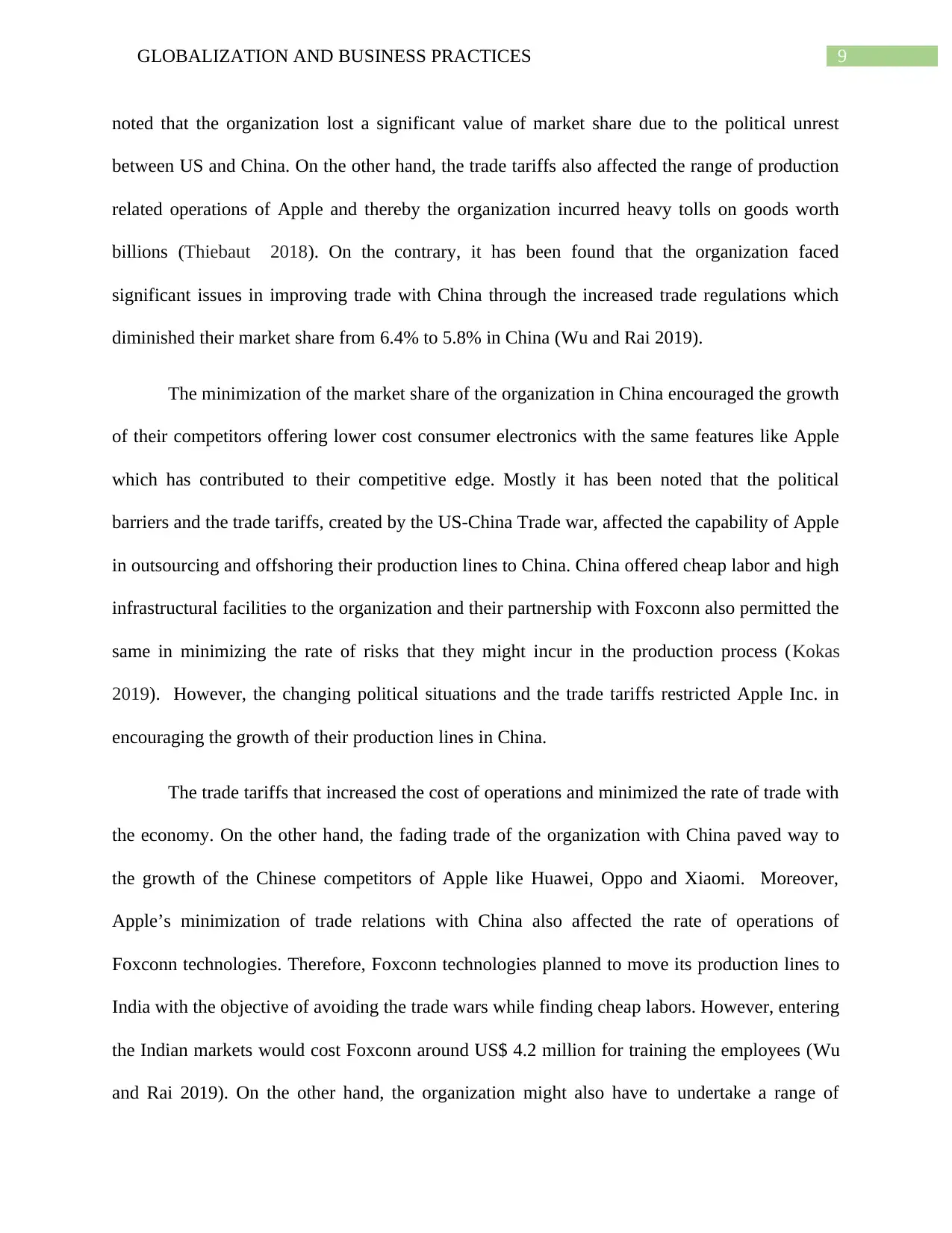
9GLOBALIZATION AND BUSINESS PRACTICES
noted that the organization lost a significant value of market share due to the political unrest
between US and China. On the other hand, the trade tariffs also affected the range of production
related operations of Apple and thereby the organization incurred heavy tolls on goods worth
billions (Thiebaut 2018). On the contrary, it has been found that the organization faced
significant issues in improving trade with China through the increased trade regulations which
diminished their market share from 6.4% to 5.8% in China (Wu and Rai 2019).
The minimization of the market share of the organization in China encouraged the growth
of their competitors offering lower cost consumer electronics with the same features like Apple
which has contributed to their competitive edge. Mostly it has been noted that the political
barriers and the trade tariffs, created by the US-China Trade war, affected the capability of Apple
in outsourcing and offshoring their production lines to China. China offered cheap labor and high
infrastructural facilities to the organization and their partnership with Foxconn also permitted the
same in minimizing the rate of risks that they might incur in the production process (Kokas
2019). However, the changing political situations and the trade tariffs restricted Apple Inc. in
encouraging the growth of their production lines in China.
The trade tariffs that increased the cost of operations and minimized the rate of trade with
the economy. On the other hand, the fading trade of the organization with China paved way to
the growth of the Chinese competitors of Apple like Huawei, Oppo and Xiaomi. Moreover,
Apple’s minimization of trade relations with China also affected the rate of operations of
Foxconn technologies. Therefore, Foxconn technologies planned to move its production lines to
India with the objective of avoiding the trade wars while finding cheap labors. However, entering
the Indian markets would cost Foxconn around US$ 4.2 million for training the employees (Wu
and Rai 2019). On the other hand, the organization might also have to undertake a range of
noted that the organization lost a significant value of market share due to the political unrest
between US and China. On the other hand, the trade tariffs also affected the range of production
related operations of Apple and thereby the organization incurred heavy tolls on goods worth
billions (Thiebaut 2018). On the contrary, it has been found that the organization faced
significant issues in improving trade with China through the increased trade regulations which
diminished their market share from 6.4% to 5.8% in China (Wu and Rai 2019).
The minimization of the market share of the organization in China encouraged the growth
of their competitors offering lower cost consumer electronics with the same features like Apple
which has contributed to their competitive edge. Mostly it has been noted that the political
barriers and the trade tariffs, created by the US-China Trade war, affected the capability of Apple
in outsourcing and offshoring their production lines to China. China offered cheap labor and high
infrastructural facilities to the organization and their partnership with Foxconn also permitted the
same in minimizing the rate of risks that they might incur in the production process (Kokas
2019). However, the changing political situations and the trade tariffs restricted Apple Inc. in
encouraging the growth of their production lines in China.
The trade tariffs that increased the cost of operations and minimized the rate of trade with
the economy. On the other hand, the fading trade of the organization with China paved way to
the growth of the Chinese competitors of Apple like Huawei, Oppo and Xiaomi. Moreover,
Apple’s minimization of trade relations with China also affected the rate of operations of
Foxconn technologies. Therefore, Foxconn technologies planned to move its production lines to
India with the objective of avoiding the trade wars while finding cheap labors. However, entering
the Indian markets would cost Foxconn around US$ 4.2 million for training the employees (Wu
and Rai 2019). On the other hand, the organization might also have to undertake a range of
Paraphrase This Document
Need a fresh take? Get an instant paraphrase of this document with our AI Paraphraser
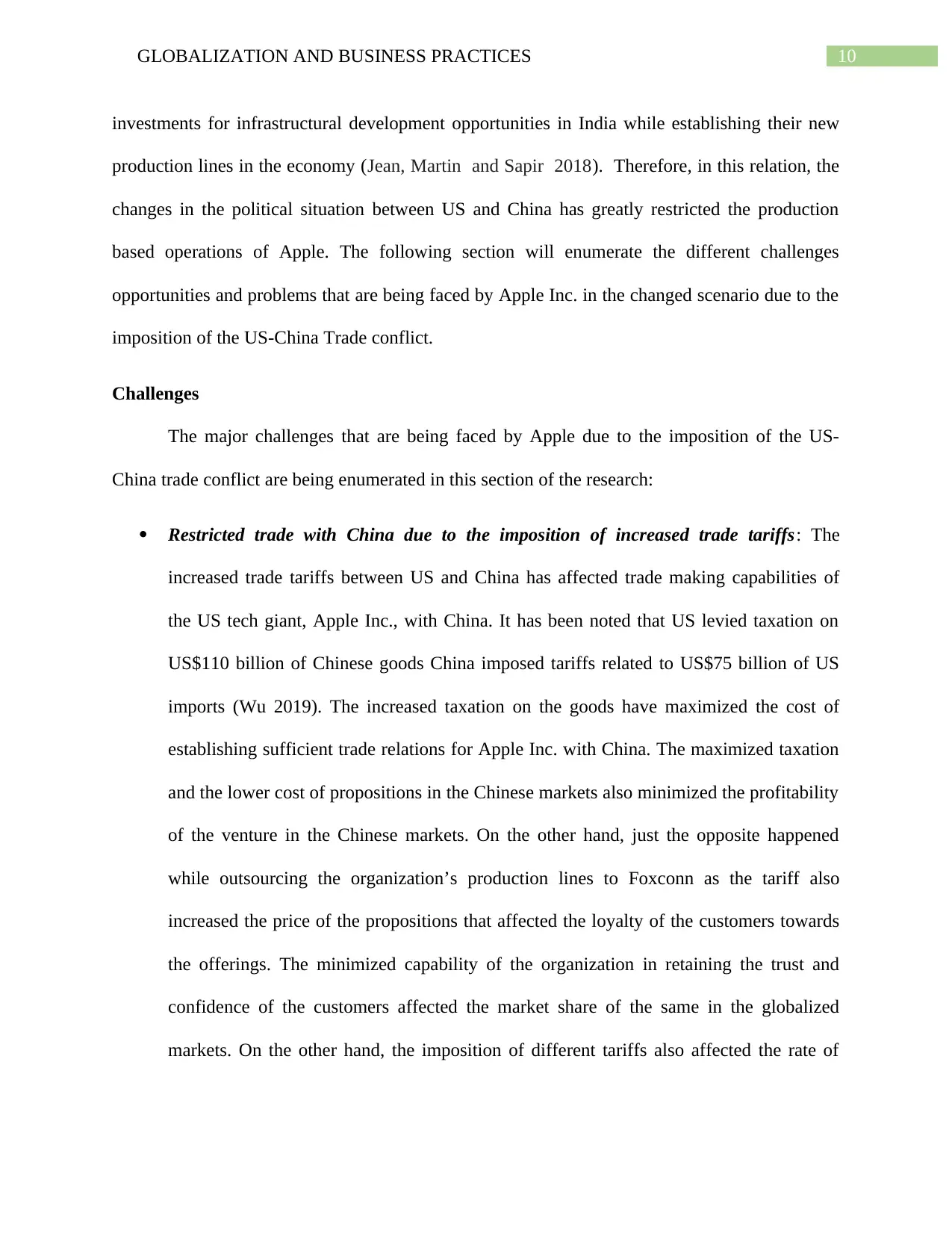
10GLOBALIZATION AND BUSINESS PRACTICES
investments for infrastructural development opportunities in India while establishing their new
production lines in the economy (Jean, Martin and Sapir 2018). Therefore, in this relation, the
changes in the political situation between US and China has greatly restricted the production
based operations of Apple. The following section will enumerate the different challenges
opportunities and problems that are being faced by Apple Inc. in the changed scenario due to the
imposition of the US-China Trade conflict.
Challenges
The major challenges that are being faced by Apple due to the imposition of the US-
China trade conflict are being enumerated in this section of the research:
Restricted trade with China due to the imposition of increased trade tariffs: The
increased trade tariffs between US and China has affected trade making capabilities of
the US tech giant, Apple Inc., with China. It has been noted that US levied taxation on
US$110 billion of Chinese goods China imposed tariffs related to US$75 billion of US
imports (Wu 2019). The increased taxation on the goods have maximized the cost of
establishing sufficient trade relations for Apple Inc. with China. The maximized taxation
and the lower cost of propositions in the Chinese markets also minimized the profitability
of the venture in the Chinese markets. On the other hand, just the opposite happened
while outsourcing the organization’s production lines to Foxconn as the tariff also
increased the price of the propositions that affected the loyalty of the customers towards
the offerings. The minimized capability of the organization in retaining the trust and
confidence of the customers affected the market share of the same in the globalized
markets. On the other hand, the imposition of different tariffs also affected the rate of
investments for infrastructural development opportunities in India while establishing their new
production lines in the economy (Jean, Martin and Sapir 2018). Therefore, in this relation, the
changes in the political situation between US and China has greatly restricted the production
based operations of Apple. The following section will enumerate the different challenges
opportunities and problems that are being faced by Apple Inc. in the changed scenario due to the
imposition of the US-China Trade conflict.
Challenges
The major challenges that are being faced by Apple due to the imposition of the US-
China trade conflict are being enumerated in this section of the research:
Restricted trade with China due to the imposition of increased trade tariffs: The
increased trade tariffs between US and China has affected trade making capabilities of
the US tech giant, Apple Inc., with China. It has been noted that US levied taxation on
US$110 billion of Chinese goods China imposed tariffs related to US$75 billion of US
imports (Wu 2019). The increased taxation on the goods have maximized the cost of
establishing sufficient trade relations for Apple Inc. with China. The maximized taxation
and the lower cost of propositions in the Chinese markets also minimized the profitability
of the venture in the Chinese markets. On the other hand, just the opposite happened
while outsourcing the organization’s production lines to Foxconn as the tariff also
increased the price of the propositions that affected the loyalty of the customers towards
the offerings. The minimized capability of the organization in retaining the trust and
confidence of the customers affected the market share of the same in the globalized
markets. On the other hand, the imposition of different tariffs also affected the rate of
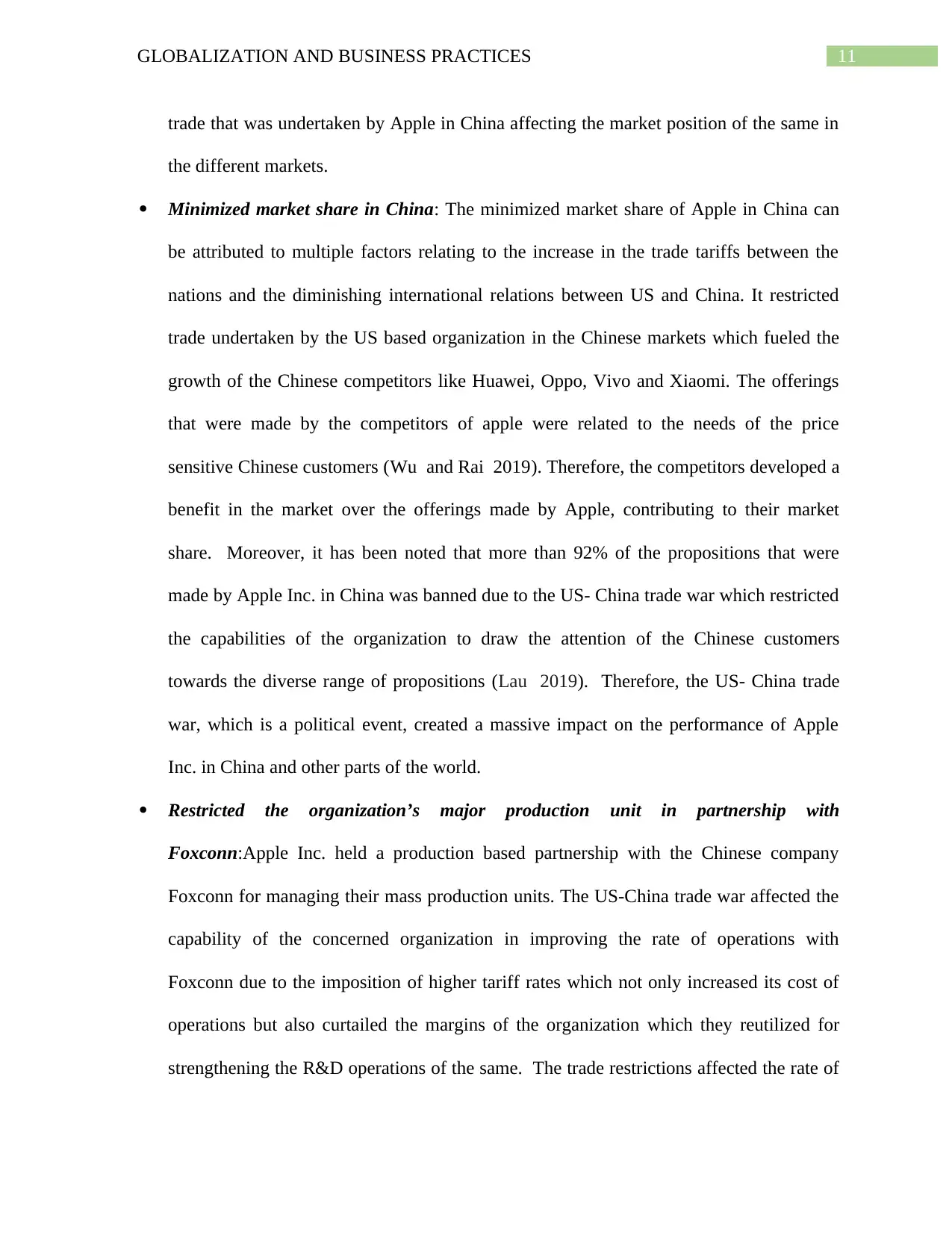
11GLOBALIZATION AND BUSINESS PRACTICES
trade that was undertaken by Apple in China affecting the market position of the same in
the different markets.
Minimized market share in China: The minimized market share of Apple in China can
be attributed to multiple factors relating to the increase in the trade tariffs between the
nations and the diminishing international relations between US and China. It restricted
trade undertaken by the US based organization in the Chinese markets which fueled the
growth of the Chinese competitors like Huawei, Oppo, Vivo and Xiaomi. The offerings
that were made by the competitors of apple were related to the needs of the price
sensitive Chinese customers (Wu and Rai 2019). Therefore, the competitors developed a
benefit in the market over the offerings made by Apple, contributing to their market
share. Moreover, it has been noted that more than 92% of the propositions that were
made by Apple Inc. in China was banned due to the US- China trade war which restricted
the capabilities of the organization to draw the attention of the Chinese customers
towards the diverse range of propositions (Lau 2019). Therefore, the US- China trade
war, which is a political event, created a massive impact on the performance of Apple
Inc. in China and other parts of the world.
Restricted the organization’s major production unit in partnership with
Foxconn:Apple Inc. held a production based partnership with the Chinese company
Foxconn for managing their mass production units. The US-China trade war affected the
capability of the concerned organization in improving the rate of operations with
Foxconn due to the imposition of higher tariff rates which not only increased its cost of
operations but also curtailed the margins of the organization which they reutilized for
strengthening the R&D operations of the same. The trade restrictions affected the rate of
trade that was undertaken by Apple in China affecting the market position of the same in
the different markets.
Minimized market share in China: The minimized market share of Apple in China can
be attributed to multiple factors relating to the increase in the trade tariffs between the
nations and the diminishing international relations between US and China. It restricted
trade undertaken by the US based organization in the Chinese markets which fueled the
growth of the Chinese competitors like Huawei, Oppo, Vivo and Xiaomi. The offerings
that were made by the competitors of apple were related to the needs of the price
sensitive Chinese customers (Wu and Rai 2019). Therefore, the competitors developed a
benefit in the market over the offerings made by Apple, contributing to their market
share. Moreover, it has been noted that more than 92% of the propositions that were
made by Apple Inc. in China was banned due to the US- China trade war which restricted
the capabilities of the organization to draw the attention of the Chinese customers
towards the diverse range of propositions (Lau 2019). Therefore, the US- China trade
war, which is a political event, created a massive impact on the performance of Apple
Inc. in China and other parts of the world.
Restricted the organization’s major production unit in partnership with
Foxconn:Apple Inc. held a production based partnership with the Chinese company
Foxconn for managing their mass production units. The US-China trade war affected the
capability of the concerned organization in improving the rate of operations with
Foxconn due to the imposition of higher tariff rates which not only increased its cost of
operations but also curtailed the margins of the organization which they reutilized for
strengthening the R&D operations of the same. The trade restrictions affected the rate of
⊘ This is a preview!⊘
Do you want full access?
Subscribe today to unlock all pages.

Trusted by 1+ million students worldwide
1 out of 18
Related Documents
Your All-in-One AI-Powered Toolkit for Academic Success.
+13062052269
info@desklib.com
Available 24*7 on WhatsApp / Email
![[object Object]](/_next/static/media/star-bottom.7253800d.svg)
Unlock your academic potential
Copyright © 2020–2026 A2Z Services. All Rights Reserved. Developed and managed by ZUCOL.





